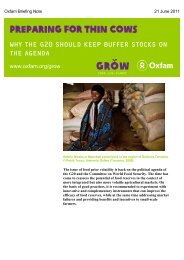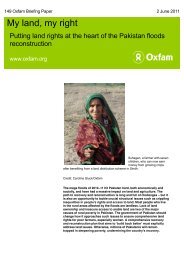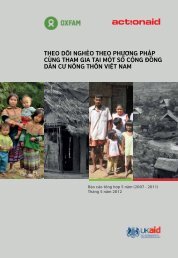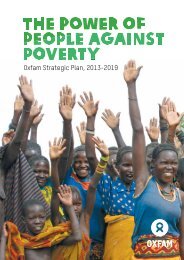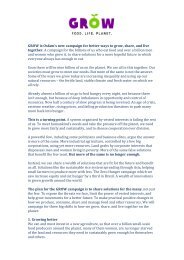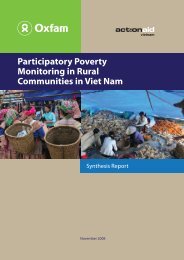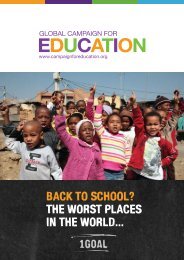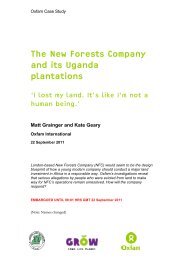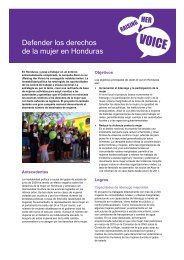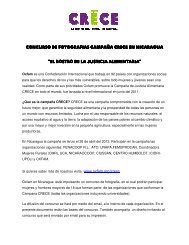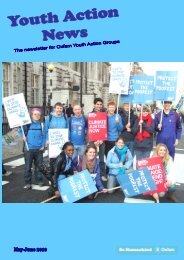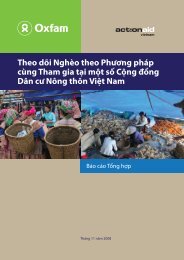OXFAM GHANA ANNUAL REPORT - Oxfam Blogs
OXFAM GHANA ANNUAL REPORT - Oxfam Blogs
OXFAM GHANA ANNUAL REPORT - Oxfam Blogs
You also want an ePaper? Increase the reach of your titles
YUMPU automatically turns print PDFs into web optimized ePapers that Google loves.
<strong>OXFAM</strong> <strong>GHANA</strong><br />
<strong>ANNUAL</strong> <strong>REPORT</strong><br />
2012 - 2013<br />
Paul Yenparaye, ELCAP beneficiary, Zambogu Community<br />
in the Nadowli District; Credit, Prosper Kuorsoh, GNA
LIST OF ABBREVIATIONS<br />
AGRA<br />
CHVs<br />
CICOL<br />
CPP<br />
ELCAP<br />
FRI<br />
GAWU<br />
GBC<br />
GHS<br />
GTV<br />
HIV/AIDS<br />
IEA<br />
INGO<br />
ISODEC<br />
NDC<br />
NHIA<br />
NHIS<br />
NOGCAF<br />
NPP<br />
PARDA<br />
PARED<br />
PAS-G<br />
PFAG<br />
PIAC<br />
PNC<br />
PPP<br />
TBA<br />
UN<br />
USAID<br />
VAT<br />
WiLDAF<br />
WOM<br />
Alliance for Green Revolution in Africa<br />
Community health volunteers<br />
Civil Society Coalition on Land<br />
Convention People’s Party<br />
Enhancing Livelihoods through Climate Change Adaptation<br />
and Learning Project<br />
Farm Radio International<br />
Ghana Agriculture Workers Union<br />
Ghana Broadcasting Corporation<br />
Ghana Health Service<br />
Ghana Television<br />
Human Immune Virus/Acquired Immune Deficiency Syndrome<br />
Institute of Economic Affairs<br />
International non-governmental organisation<br />
Integrated Social Development Centre<br />
National Democratic Congress<br />
National Health Insurance Authority<br />
National Health Insurance Scheme<br />
Northern Ghana Community Action Fund<br />
New Patriotic Party<br />
Participatory Action for Rural Development Alternatives<br />
Partners in Rural Empowerment and Development<br />
Presbyterian Agricultural Station, Garu<br />
Peasant Farmers Association of Ghana<br />
Public Interest and Accountability Committee<br />
People’s National Convention<br />
Progressive People’s Party<br />
Traditional birth attendant<br />
United Nations<br />
United States Agency for International Development<br />
Value Added Tax<br />
Women in Law and Development in Africa<br />
Women and Orphans Movement
<strong>OXFAM</strong> <strong>GHANA</strong> <strong>ANNUAL</strong> <strong>REPORT</strong> 2012 - 2013<br />
1<br />
CONTENTS<br />
Message from the Country Director 02<br />
About <strong>Oxfam</strong> 03<br />
PROGRAMME HIGHLIGHTS: 05<br />
GROW campaign 06<br />
Enhancing Livelihoods through Climate Change Adaptation and Learning Project (ELCAP) 13<br />
Universal Access to Health Care campaign 17<br />
Maternal and child health 22<br />
Extractive industries Iniactive 27<br />
Humanitarian services and disaster risk reduction 30<br />
Capacity development and gender mainstreaming 31<br />
Finance and human resources 34<br />
Outlook for 2013/14 36
2 MESSAGE FROM THE COUNTRY DIRECTOR | <strong>OXFAM</strong> <strong>GHANA</strong> <strong>ANNUAL</strong> <strong>REPORT</strong> 2012 - 2013<br />
MESSAGE FROM THE COUNTRY DIRECTOR<br />
<strong>Oxfam</strong> in Ghana continues to advocate for a just<br />
and equitable society where everyone in Ghana<br />
is healthy and has enough to eat, and where<br />
authorities are accountable and responsive to their<br />
citizens.<br />
During the year under review, <strong>Oxfam</strong> in Ghana<br />
sought to combine these two goals by engaging<br />
communities and candidates in the national<br />
elections of December 2012. Supporting civil<br />
society partners and building on the demands<br />
raised by communities, for example through the<br />
development of a “Farmers’ Manifesto”, those<br />
seeking political office were encouraged to commit<br />
to investing more in Ghana’s small-scale farmers,<br />
provide free universal access to health care, and<br />
strengthen transparency and accountability in the<br />
country’s extractive industries.<br />
improve maternal health care and to increase the<br />
number of skilled deliveries.<br />
As a result of community-level meetings with<br />
candidates, the signing of pledge cards, policy<br />
dialogue with women farmers, debates and media<br />
activities – amongst much else – we believe that<br />
<strong>Oxfam</strong> and our partners have made a positive<br />
contribution to focusing greater attention on the<br />
key issues of millions of voters. But there is a long<br />
way to go before electoral promises are translated<br />
into action, and we will continue to support civil<br />
society in its efforts to ensure that they are.<br />
The following report reflects an overview of our<br />
work in 2012/13, and the lessons we have tried to<br />
draw from it. As ever, we appreciate your support<br />
and partnership in this endeavour.<br />
Sebastian Tiah<br />
Country Director<br />
<strong>Oxfam</strong> in Ghana<br />
We also provided direct support to communities<br />
lacking key services, with a strong emphasis on<br />
supporting poor women. In communities across<br />
the Northern, Upper East and Upper West regions,<br />
<strong>Oxfam</strong> continued an innovative pilot project to<br />
enable communities to adapt their livelihoods<br />
to the growing impact of climate change. In the<br />
Upper East Region we assisted traditional birth<br />
attendants and community health volunteers to
<strong>OXFAM</strong> <strong>GHANA</strong> <strong>ANNUAL</strong> <strong>REPORT</strong> 2012 - 2013 | ABOUT <strong>OXFAM</strong><br />
3<br />
ABOUT <strong>OXFAM</strong><br />
<strong>Oxfam</strong> is an international confederation of<br />
17 organisations networked in more than 90<br />
countries, whose aim is to build a future free from<br />
the injustice of poverty. <strong>Oxfam</strong> began working<br />
in Ghana in 1986 in the West Mamprusi District,<br />
tackling chronic water and sanitation issues.<br />
Over the years we have invested in the provision<br />
of water and sanitation, micro finance, health,<br />
hygiene and education facilities to rural and<br />
farming communities. We challenge unjust policies<br />
and practices and we respect people’s rights.<br />
In 2008, a decision was made for all <strong>Oxfam</strong> affiliates<br />
to operate under a Single Management Structure<br />
(SMS), which aims to align and harmonise <strong>Oxfam</strong>’s<br />
work, enhance synergy and maximise impact. The<br />
Ghana country programme, with <strong>Oxfam</strong> GB and<br />
<strong>Oxfam</strong> America as affiliates, has developed a Joint<br />
Country Analysis and Strategy (JCAS) under the<br />
SMS, to be implemented until 2015.<br />
OUR MISSION<br />
<strong>Oxfam</strong>’s mission is to work with others to find<br />
lasting solutions to poverty and suffering. With<br />
partners and allies, we act in solidarity with people<br />
living in poverty, especially women, to achieve their<br />
rights and assert their dignity as full citizens.<br />
OUR VISION<br />
Our vision is a Ghana with an improved quality<br />
of life, characterised by active citizenship, and<br />
shared, pro-poor and sustainable growth in a just<br />
and democratic environment.<br />
OUR CORE VALUES<br />
• Accountability. We hold ourselves<br />
accountable in everything we do and demand<br />
the same from others, including individuals,<br />
governments and corporations.<br />
The JCAS guides our strategic focus, and was<br />
developed in consultation with <strong>Oxfam</strong>’s partners<br />
and allies, and in consideration of our experience,<br />
relative strengths and the Ghanaian context. As<br />
such, <strong>Oxfam</strong>’s work has focused on supporting<br />
civil society advocacy and research for better<br />
accountability and a fair distribution of resources<br />
in the agriculture, health, and extractive industry<br />
sectors.<br />
• Inclusiveness. We include and involve all<br />
stakeholders in all aspects of our work. We<br />
like to listen to and learn from our diverse<br />
global community. We are open to everyone,<br />
regardless of ethnic background or religion.<br />
• Empowerment. We seek to ensure<br />
that everyone involved with <strong>Oxfam</strong> feels<br />
empowered.<br />
• Honesty and realism. We commit<br />
to actions that we can deliver on and<br />
communicate openly about priorities,
4 ABOUT <strong>OXFAM</strong> | <strong>OXFAM</strong> <strong>GHANA</strong> <strong>ANNUAL</strong> <strong>REPORT</strong> 2012 - 2013<br />
decisions and agreements.<br />
• Delivery. We are focused on timely delivery<br />
of results.<br />
<strong>OXFAM</strong>’S APPROACH IN <strong>GHANA</strong><br />
<strong>Oxfam</strong> promotes ownership and partner-driven<br />
interventions in Ghana, with results, value for<br />
money and transparency as key guiding principles.<br />
Our approach and strategy in Ghana focus on:<br />
• Combining long-term development,<br />
humanitarian assistance, campaigning and<br />
advocacy to tackle the root causes of poverty.<br />
• Advocacy and facilitation, rather than direct<br />
service delivery.<br />
• Supporting and strengthening credible<br />
Ghanaian movements to become better<br />
engaged in the formulation, implementation<br />
and monitoring of the government’s policies.<br />
• Strengthening local to national links in<br />
advocacy work and alliance-building.<br />
• Emphasising the needs of women and<br />
vulnerable groups, facilitating linkages<br />
between women and producer organisations<br />
as well as other actors and services.<br />
• Ensuring that <strong>Oxfam</strong> adds value to partners<br />
in terms of expertise and international links,<br />
to the benefit of both partners’ work in Ghana<br />
and <strong>Oxfam</strong>’s work elsewhere.<br />
• Working collaboratively and openly with a wide<br />
range of allies.<br />
• Measuring our impact, rather than the<br />
extent of our financing. This process aims to<br />
harmonise <strong>Oxfam</strong>’s work, create synergy and<br />
maximise impact.<br />
• Supporting regional and global campaigns.<br />
OUR OBJECTIVES<br />
In line with our vision for Ghana, the following<br />
changes are anticipated by 2015:<br />
• Ghanaian citizens will benefit from<br />
accountable, natural resource governance<br />
that ensures the participation of poor<br />
women and men in decision-making and<br />
resource-allocation processes for sustainable<br />
development.<br />
• More women and men small-scale producers<br />
will have a stronger voice in food and<br />
agriculture policy processes and become<br />
drivers of economic change through access to<br />
land and effective value chains.<br />
• Ghana should meets its African Union<br />
commitments by investing 10% of its national<br />
budget in agriculture, ensuring small-scale<br />
farmers are prioritised in these investments.<br />
• Men and women will have increased their<br />
resilience and capacity to adapt to climate<br />
change, through responses focusing on the<br />
livelihoods of poor women.<br />
• Government of Ghana will have provided<br />
alternative sources of funding, including the<br />
implementation of the one-time National<br />
Health Insurance Scheme (NHIS) premium, to<br />
make quality health care accessible to poor<br />
women and men.
<strong>OXFAM</strong> <strong>GHANA</strong> <strong>ANNUAL</strong> <strong>REPORT</strong> 2012 - 2013<br />
5<br />
PROGRAMME<br />
HIGHLIGHTS
6 <strong>OXFAM</strong> <strong>GHANA</strong> <strong>ANNUAL</strong> <strong>REPORT</strong> 2012 - 2013<br />
THE GROW<br />
CAMPAIGN<br />
BACKGROUND<br />
The context and problem<br />
There is a growing injustice in the global food<br />
production and distribution system. Current<br />
systems of production do not safeguard the<br />
environment for future generations. Inadequate<br />
support to smallholder agriculture, gender<br />
inequality, and land grabs are unfavourable to<br />
the large majority of the population. Even though<br />
government investment in agriculture is above 10%<br />
of the government’s budget, as promised in the<br />
2003 African Union Maputo Declaration, this funding<br />
does not reach small-scale farmers. Land used by<br />
small-scale farmers is being sold for large-scale<br />
commercial agriculture which may not enhance<br />
food security or sovereignty. Climate change is<br />
further adding to the woes of the small-scale<br />
farmer.<br />
AIMS AND ACTIVITIES<br />
The campaign and partners<br />
<strong>Oxfam</strong>’s GROW campaign is active in 57 countries<br />
across the world, including Ghana. Its aim is a world<br />
in which everyone has enough to eat at all times<br />
and the environment is safeguarded. The campaign<br />
focuses on increasing investment in smallholder<br />
agriculture and securing access to land for smallscale<br />
farmers, especially women. In <strong>Oxfam</strong>, we work<br />
with and support partners to achieve maximum<br />
impact. Partners for the campaign in Ghana include<br />
Civil Society Coalition on Land (CICOL), Women in<br />
Law and Development in Africa (WiLDAF-Ghana),<br />
Peasant Farmers Association of Ghana (PFAG) and<br />
SEND Ghana. In addition, allies including Farm Radio<br />
Ghana, ActionAid Ghana, Ghana Agriculture Workers<br />
Union, and Ghana Trade and Livelihood Coalition<br />
have joined the campaign.
<strong>OXFAM</strong> <strong>GHANA</strong> <strong>ANNUAL</strong> <strong>REPORT</strong> 2012 - 2013 | THE GROW CAMPAIGN<br />
7<br />
The focus in 2012: Influencing election<br />
campaigning<br />
Opposition parties and citizens in general demand<br />
accountability and fulfilment of the manifesto<br />
promises made by government. The GROW campaign<br />
thus worked to try to ensure that political parties’<br />
2012 election manifestos reflected the needs of<br />
the population, and catered to the priority needs<br />
of smallholder farmers. This included the following<br />
actions:<br />
Influencing the national development<br />
agenda<br />
Partners in the GROW campaign wanted to make<br />
sure the voices of small-scale farmers were<br />
present and clear in electoral debates, so they<br />
set out to develop a ‘Farmers’ Manifesto’ through<br />
consultation meetings with farmers’ groups, civil<br />
society organisations and political parties across<br />
the country. The manifesto included demands for:<br />
• Greater quality investment in agriculture in<br />
favour of women and men small-scale farmers.<br />
• Greater access to productive agricultural land<br />
by women and men small-scale farmers.<br />
• Special attention for small-scale farmers in<br />
the implementation of existing agricultural<br />
policies.<br />
• Sustainable economic development and<br />
investment plans.<br />
• Acknowledgement and support of the central<br />
role of women in agricultural production.
8 THE GROW CAMPAIGN | <strong>OXFAM</strong> <strong>GHANA</strong> <strong>ANNUAL</strong> <strong>REPORT</strong> 2012 - 2013<br />
Promoting the Farmers’ Manifesto<br />
The Farmers’ Manifesto was launched and widely<br />
distributed among the public, as well as to<br />
presidential and parliamentary aspirants, to help<br />
ensure that the voices and opinions of farmers<br />
were reflected in political party manifestos.<br />
Representatives of farmers’ and civil society<br />
organisations met with political party leaders and<br />
their manifesto drafting committees, as well as key<br />
parliamentary candidates, to encourage them to<br />
include key issues in their visions for Ghana.<br />
Forums were also held at community level for<br />
parliamentary candidates to interact with farmers<br />
policies to the electorate, and also contributed to<br />
the government’s 2013 Budget and Economic Policy<br />
Statement to highlight the issues raised in the<br />
Farmers’ Manifesto.<br />
“We are<br />
interested<br />
in irrigation<br />
dams, farm<br />
inputs and<br />
factories that<br />
can absorb<br />
our produce.”<br />
“The marginal contribution of agriculture<br />
to GDP is due to the use of rudimentary<br />
technology.<br />
The marginalisation of small-scale<br />
farmers in terms of investment, finance<br />
and rural infrastructure constitute the<br />
basic conditions for poverty of most<br />
Ghanaians.” Sylvester Bagooro, Third<br />
World Network-Africa<br />
and to encourage them to sign ‘pledge cards’ in<br />
support of small-scale agriculture, against which<br />
they would report back to communities if elected<br />
to office. The campaign also held policy dialogues<br />
with politicians and policy makers on policy options<br />
for smallholder agriculture development and food<br />
security in Ghana. The campaign participated in an<br />
event organised by the Institute of Economic Affairs<br />
(IEA) for presidential candidates to present their<br />
Mohammed Nashiru, President,<br />
Peasant Farmers Association of<br />
Ghana, at the launch of the farmers<br />
manifesto;<br />
credit: <strong>Oxfam</strong>
<strong>OXFAM</strong> <strong>GHANA</strong> <strong>ANNUAL</strong> <strong>REPORT</strong> 2012 - 2013 | THE GROW CAMPAIGN<br />
9<br />
Women’s dialogue (27th September<br />
2012)<br />
The ‘Women’s Dialogue with Political Parties’<br />
initiative at the College of Surgeons and Physicians<br />
in Accra was another major campaign activity<br />
during the year. This event, which was organised<br />
by WiLDAF with support from the GROW campaign,<br />
provided a platform for political parties contesting<br />
the 2012 elections to present their vision and<br />
intended policies to women, who form 51.4% of<br />
the Ghanaian population. More than 750 people<br />
attended, including representatives from faithbased<br />
organisations, small-scale farmers, and<br />
persons with disability. The political parties CPP,<br />
PNC and PPP were represented by their 2012<br />
presidential candidates, while the GFP, NDC and NPP<br />
sent representatives to take part in the dialogue<br />
Public and political<br />
engagements<br />
a) International Rural Women’s Day (15<br />
October 2012)<br />
The Farmers Organisation Network in Ghana and<br />
Development Action Association, with support<br />
from <strong>Oxfam</strong> in Ghana, ActionAid Ghana, UN Women,<br />
World Food Programme (WFP), Alliance for Green<br />
Revolution in Africa (AGRA) and Yara celebrated<br />
the global Rural Women’s Day with an event on the<br />
theme “Empowerment and the Role of Rural Women<br />
in Poverty and Hunger Eradication”. This was<br />
attended by more than 1,000 rural women farmers<br />
from across Ghana, representatives from INGOs<br />
and civil society, donors, researchers, public and<br />
private media, chiefs and political parties.<br />
Cross-section of women at the dialogue; credit: <strong>Oxfam</strong>
10 THE GROW CAMPAIGN | <strong>OXFAM</strong> <strong>GHANA</strong> <strong>ANNUAL</strong> <strong>REPORT</strong> 2012 - 2013<br />
Key dignitaries who participated included the<br />
Deputy Minister for Women and Children Affairs, Hon.<br />
Hawawu Gariba Boya, who chaired the event; Cheryl<br />
Anderson, United States Agency for International<br />
Development (USAID) Mission Director; Margaret Kyei<br />
Manu, Greater Accra Regional Director, Ministry of<br />
Food and Agriculture; and Nii Armah Tackie, Chief<br />
Executive, Ga West Municipal Assembly. Women<br />
smallholder farmers in Ghana used the opportunity<br />
to call for responsive government policies. Women’s<br />
empowerment will lead to much desired positive<br />
changes in the lives of families, communities and in<br />
the nation as whole.<br />
Representatives of rural women<br />
participating in the event raised issues on:<br />
• Rural women’s non-involvement in<br />
policy formulation.<br />
• Challenges with land tenure.<br />
• Need for irrigation for farming.<br />
• Lack of access to basic farming<br />
equipment .<br />
• Agricultural mechanisation.<br />
The campaign supported partner organisations to<br />
enable women farmers to participate in the event.<br />
The women farmers showcased crops including<br />
vegetables, cereals, nuts, roots and tubers. The<br />
Deputy Minister and other dignitaries commended<br />
the women for an excellent display.<br />
Giving a<br />
voice to rural<br />
women is<br />
important<br />
because<br />
“they produce<br />
70-80% of the<br />
food crops<br />
in Ghana”.<br />
Lydia Sasu,<br />
President<br />
of Women’s<br />
College of<br />
Farmers in<br />
Ghana; credit:<br />
<strong>Oxfam</strong>.
<strong>OXFAM</strong> <strong>GHANA</strong> <strong>ANNUAL</strong> <strong>REPORT</strong> 2012 - 2013 | THE GROW CAMPAIGN<br />
11<br />
b. World Food Day (16 October 2012)<br />
More than 2,000 women small-scale farmers and<br />
youth supported the campaign to mark World Food<br />
Day. In addition, the GROW campaign supported<br />
Economic Justice Network-Ghana to organise a live<br />
radio debate, “Call for Political Debate on Agrarian<br />
Transformation”. The programme brought issues of<br />
agriculture and rural transformation to the fore, and<br />
representatives of farmer organisations used the<br />
opportunity to state their position on agriculture in<br />
Ghana.<br />
c) International Women’s Day (8 March<br />
2013)<br />
<strong>Oxfam</strong> in Ghana supported Women in Law and<br />
Development in Africa (WiLDAF-Ghana) and the<br />
Peasant Farmers Association of Ghana (PFAG) to<br />
celebrate the 2013 International Women’s Day on<br />
the theme “Mainstreaming gender and women’s<br />
rights in agriculture and food policy programmes.”<br />
Women speaking at the event drew policy makers’<br />
attention to key development issues related to<br />
ending poverty and injustice against vulnerable<br />
people. They expressed concern about a lack<br />
of social facilities for childcare, and the need<br />
for water and fuel wood to help improve their<br />
productivity.<br />
d) Contributing to the government’s<br />
2013 budget<br />
GROW campaign members developed and submitted<br />
inputs into the Ghanaian government’s 2013 Budget<br />
and Economic Policy Statement. These concerned<br />
greater rights over productive land for small-scale<br />
women farmers and better quality investment in<br />
smallholder agriculture and food security. The<br />
campaign also highlighted the need for government<br />
to: improve public support for smallholder<br />
agriculture, address the constraints facing women<br />
farmers in particular, link research to agricultural<br />
extension services, improve access to mechanised<br />
tractor services, and credit, and focus attention on<br />
climate-resilient sustainable agriculture.<br />
Building knowledge through<br />
research and policy<br />
development<br />
Research to generate and strengthen evidence<br />
for the GROW campaign in Ghana was undertaken<br />
on women and small-scale producers’ rights to<br />
land. Factsheets were developed and distributed<br />
and communities engaged in the research. A<br />
study was also conducted relating the national<br />
land policy to the African Union Framework and<br />
Guidelines on Land Policy. The report will be used<br />
to engage the National House of Chiefs to address<br />
the persistent challenges in the land sector.<br />
Other studies centred on public and private sector<br />
investment in sustainable smallholder agriculture,<br />
social protection and food security in West Africa,<br />
and a gender audit of the national land policy and<br />
customary land practices.
12 THE GROW CAMPAIGN | <strong>OXFAM</strong> <strong>GHANA</strong> <strong>ANNUAL</strong> <strong>REPORT</strong> 2012 - 2013<br />
ACHIEVEMENTS AND IMPACT<br />
LESSONS AND CHALLENGES<br />
1. Greater profile for small-scale food producers<br />
in Ghana and the challenges they face. The<br />
launch of the Farmers’ Manifesto was widely<br />
covered in both print and electronic media.<br />
2. Strengthened engagement with government<br />
and political parties. This included a meeting<br />
with 17 Directors of the Ministry of Food and<br />
Agriculture led by the Chief Director, and<br />
with three presidential and 12 parliamentary<br />
aspirants.<br />
3. A stronger civil society movement for<br />
food security. Farmers and civil society<br />
organisations were strengthened to advocate<br />
for smallholder agriculture development and<br />
food security in Ghana.<br />
4. Securing electoral commitments for food<br />
security. The CPP, NPP and PPP presidential<br />
aspirants as well as 12 parliamentary<br />
candidates signed and submitted pledge<br />
cards, while the NDC committed to further<br />
engage with the campaign on the issues in the<br />
Farmers’ Manifesto. These pledges included<br />
to improve access of smallholder farmers to<br />
appropriate agricltural technologies, irrigation<br />
facilities, tax incentives, low interest loans,<br />
roads infrastructure, and ready markets for<br />
agricultural produce, and the involvement of<br />
women farmers in decision making.<br />
Engaging politicians in an election year has clearly<br />
been a fruitful process. The Farmers’ Manifesto<br />
serves as a voice of smallholder farmers in Ghana<br />
and is an accountability tool that continues to be<br />
used after the 2012 elections.<br />
Key challenges identified by the campaign include:<br />
• Limited time and resources to respond to<br />
existing and emerging opportunities.<br />
• A need to further strengthen coordination and<br />
collaboration amongst partners.<br />
• A need to make the public face of the campaign<br />
more visible.
<strong>OXFAM</strong> <strong>GHANA</strong> <strong>ANNUAL</strong> <strong>REPORT</strong> 2012 - 2013<br />
13<br />
ENHANCING<br />
LIVELIHOODS<br />
THROUGH<br />
CLIMATE CHANGE<br />
ADAPTATION AND<br />
LEARNING PROJECT<br />
BACKGROUND<br />
Upper West, Upper East and Northern regions<br />
record a high incidence of poverty and food<br />
insecurity, despite the overall growth of Ghana’s<br />
economy in recent years. Agriculture, the main<br />
source of livelihoods, is under serious threat due<br />
to climate change. <strong>Oxfam</strong> launched the Enhancing<br />
Livelihoods through Climate Change Adaptation<br />
and Learning Project (ELCAP) in April 2012 as a oneyear<br />
pilot in eight farming communities in the East<br />
Mamprusi, Garu Tampane, Nandom and Nadowli<br />
districts. ELCAP has now been extended to 16<br />
communities and up to 2015. <strong>Oxfam</strong> works with four<br />
national NGOs who implement the project to benefit<br />
a target of 3,000 farmers, 70% of whom are women.<br />
AIMS AND ACTIVITIES<br />
Securing the natural resource<br />
base – soil and water<br />
conservation<br />
Beneficiaries in three communities planted 600<br />
mango seedlings for vegetative cover and fruits.<br />
Women in Dambolteng nursed and supplied 4,000<br />
acacia seedlings to their own and surrounding<br />
communities. In addition, 324 households<br />
in Yapala, Sumniboma and Gbanterego were<br />
supported to construct energy-saving stoves for<br />
cooking, contributing to a reduction in the use<br />
of wood for domestic fuel. Thirteen ‘fire squads’<br />
comprising of 150 men and 99 women volunteers<br />
in six communities were trained and equipped<br />
to prevent and manage bushfires. At least 21<br />
bushfires were put out by these volunteers in the<br />
dry season<br />
The project seeks to enhance the capacity of rural<br />
communities to adapt to climate change in the<br />
following areas:
14 ENHANCING LIVELIHOODS THROUGH CLIMATE CHANGE ADAPTATION AND LEARNING PROJECT | <strong>OXFAM</strong> <strong>GHANA</strong> <strong>ANNUAL</strong> <strong>REPORT</strong> 2012 - 2013<br />
with a pair of bullocks and a plough each to help<br />
in land preparation, while six more women and<br />
one man were supplied with a donkey and cart<br />
to help farmers in three communities transport<br />
their produce. A total of 78 women and 62 men<br />
participated in farmer ‘field school’ sessions to<br />
facilitate farmer-to-farmer learning and adaption<br />
of improved farming techniques. These included<br />
minimal tillage, compost manure preparation,<br />
zai 1 method as well as ‘tie and ridging’ and stone<br />
bonding to secure soil fertility and retain limited<br />
rainwater on farmlands.<br />
Enhancing food production and<br />
availability<br />
The project facilitated the recovery of 1.5 acres<br />
of barren land through innovative farming<br />
methods learned from farmers in Burkina Faso.<br />
We supported 572 farmers by providing early<br />
maturing, drought tolerant and high yielding seed<br />
varieties of maize, beans, onions and water melon<br />
seeds. Four women and one man were provided<br />
1<br />
Zai is a both soil and water conservation<br />
agricultural technique in which the farmer makes a<br />
hole on the farm, fills the hold with compost manure<br />
and covers it before seeds are sown. It allows for<br />
more efficient use of the mannure
<strong>OXFAM</strong> <strong>GHANA</strong> <strong>ANNUAL</strong> <strong>REPORT</strong> 2012 - 2013 | ENHANCING LIVELIHOODS THROUGH CLIMATE CHANGE ADAPTATION AND LEARNING PROJECT<br />
15<br />
Improving farmers’ income<br />
<strong>Oxfam</strong> supported dry season gardening for 219 men<br />
and women farmers, by restoring spillways and<br />
transplanting vertiver grass on the embankments<br />
of two community mini-dams and providing<br />
training, seeds, farm implements, fertiliser and<br />
fungicides.<br />
We enhanced rural enterprises such as shea nut<br />
picking and processing, and supported livestock<br />
farming by providing 167 women and 18 men with<br />
355 goats and pigs. In all, 421 people, mostly<br />
women, were able to better manage and invest<br />
their incomes through the formation of Village<br />
Savings and Loans Associations.<br />
Advocacy to enhance communities’<br />
adaptation to climate change<br />
The project seeks not just to deliver services, but<br />
to empower and equip communities to engage<br />
with authorities to better access government and<br />
private sector services, and to shape their policies.<br />
Community groups were trained on advocacy skills<br />
and were linked with existing District Food Security<br />
Networks (DFSNs) to advocate for sustainable<br />
adaptation strategies. One new DFSN was created<br />
in Nandom District. Communities were able to<br />
speak out and highlight their demands in local<br />
media and community radio. Initial contacts have<br />
been established with Agriculture Mechanisation<br />
Service Centre (AMSEC), Savanna Accelerated<br />
Development Authority (SADA), the Ministry of Food<br />
and Agriculture, and micro-finance organisations<br />
at the district level to facilitate links between<br />
farmers and service providers for inputs and<br />
services. <strong>Oxfam</strong> facilitated the participation of<br />
partners and communities at participatory scenario<br />
planning sessions in two districts, and at climate<br />
adaptation network meeting. These provided<br />
project communities with an opportunity to raise<br />
their concerns about climate change adaption and<br />
food security with decision makers at district and<br />
national levels.
16<br />
ENHANCING LIVELIHOODS THROUGH CLIMATE CHANGE ADAPTATION AND LEARNING PROJECT | <strong>OXFAM</strong> <strong>GHANA</strong> <strong>ANNUAL</strong> <strong>REPORT</strong> 2012 - 2013<br />
ACHIEVEMENTS AND IMPACT<br />
There is evidence that the project is contributing<br />
to enhancing livelihoods and adaptation capacity<br />
to climate change. Some 1,600 farmers in eight<br />
communities are now more aware of climate<br />
change hazards and are learning and adapting soil<br />
and water conservation techniques, and using<br />
drought-tolerant seeds to mitigate the impact<br />
of climate change on their livelihoods. In two<br />
communities, 225 women are involved in rearing<br />
goats and pigs. Some 600 mango seedlings and<br />
4,000 acacia seedlings have been planted to serve<br />
as windbreaks, as well as providing a source of<br />
food and income generation. Village Savings and<br />
Loans Associations have been revived and formed<br />
in four project communities with a membership<br />
of 421 women and men who are using savings<br />
to enhance their livelihoods security. These<br />
benefits have even spilled over to neighbouring<br />
communities, for example Zedung community<br />
members farmer field schools while Tibani<br />
community members also learned about dry season<br />
garding.<br />
LESSONS AND CHALLENGES<br />
Lessons learnt include:<br />
• Farmer-to-farmer sharing of knowledge<br />
and skills facilitates direct and practical<br />
peer learning as well as complementing<br />
formal extension services and enhancing<br />
sustainability.<br />
• Project implementation and benefits have a<br />
spill-over effect on neighbouring communities<br />
who may not be targeted by the interventions.<br />
• ‘Zai’ farming methods proved effective at<br />
managing water and improving yields in project<br />
communities.<br />
Challenges include:<br />
• Limited access to or late arrival of fertiliser<br />
and farm inputs is a major setback to efforts to<br />
increase smallholder farmers’ productivity.<br />
• Greater time and investment in advocacy is<br />
needed for the benefits of the project to be<br />
fully realised.<br />
These adaptation strategies are leading to greater<br />
food security among households in the community.<br />
For example, as a result of the project Jaratu<br />
Dasmani from Gbanterego in Garu Tempani District<br />
of the Upper East Region of Ghana has increased<br />
her maize yield from just one or two to five sacks.<br />
She summarises the impact saying, “Good crop<br />
harvest here is everything. You will eat well and<br />
sell the surplus for income to take care of health,<br />
education, and social needs such as funerals.”<br />
Jaratu<br />
Dasmani,<br />
Shows off her<br />
maize farm.<br />
Picture by<br />
Obed Asunka,<br />
PAS-G
UNIVERSAL<br />
ACCESS TO<br />
HEALTH CARE<br />
CAMPAIGN<br />
BACKGROUND<br />
Access to health care is generally low in rural<br />
Ghana, due to a skewed distribution of health<br />
workers and facilities in favour of more affluent<br />
regions. Poor people cannot always afford outof-packet<br />
payments, which leads to preventable<br />
illnesses and deaths. The National Health<br />
Insurance Scheme (NHIS) was introduced in 2004<br />
as an alternative health financing mechanism and<br />
as a social protection measure. It covers the direct<br />
costs of health care services and medicines for<br />
most common diseases in Ghana. With mandatory<br />
membership for all Ghanaians, the NHIS was set up<br />
to ensure universal access to quality health care<br />
and ultimately improve health outcomes.<br />
However, by 2011, the NHIS was able to cover only<br />
34% of the population. This means two-thirds of<br />
the population still pays out-of-pocket for their<br />
health care needs. There are several reasons for<br />
this, most notably the fact that the NHIS is unfair<br />
and is unable to provide health care for poor<br />
people. Many Ghanaians contribute to the NHIS<br />
through tax but do not benefit from the scheme<br />
because they cannot pay insurance premiums. The<br />
NHIS is in danger of reinforcing and perpetuating<br />
historical imbalances in access to quality health<br />
services across different regions in Ghana.<br />
AIMS AND ACTIVITIES<br />
<strong>Oxfam</strong> and our partners campaigned in the run-up<br />
to the 2012 elections, calling on political parties<br />
and the government to prioritise universal access<br />
to health care. Partners included Integrated Social<br />
Development Centre (ISODEC), Essential Services<br />
Platform, the Coalition of NGOs in Health, and<br />
Alliance for Reproductive Health Rights (ARHR).<br />
The campaign ran various events and activities<br />
to mobilise members of the public to push for<br />
improvements in the implementation of the NHIS.<br />
Activities included the following.
18 UNIVERSAL ACCESS TO HEALTH CARE CAMPAIGN | <strong>OXFAM</strong> <strong>GHANA</strong> <strong>ANNUAL</strong> <strong>REPORT</strong> 2012 - 2013<br />
National debate on tax-based financing<br />
Regional-level campaign activities<br />
ISODEC and the Universal Access to Health<br />
Care Campaign (UHC), with support from <strong>Oxfam</strong>,<br />
organised a national debate on tax-based<br />
financing of health care at the British Council<br />
in Accra on 15 November 2012. The event was<br />
attended by 97 participants from the National<br />
Health Insurance Authority (NHIA), the Ministry<br />
of Health, Ghana Health Service, health service<br />
providers, civil society groups, political party<br />
representatives and the media.<br />
‘Health crisis’ talks and forums were held in five<br />
regions across the country: Greater Accra, Ashanti,<br />
Brong Afhafo, Northern and Upper East regions. The<br />
regional breakdown of the participants are shown<br />
in Fig. 1<br />
The debate highlighted the fact that the scheme<br />
is in a state of financial distress, and that the<br />
poorest and most vulnerable people are still not<br />
covered by it. There was consensus that taxbased<br />
financing is key to ensuring the financial<br />
sustainability of the NHIS and enabling it to<br />
provide universal access to health care in Ghana.<br />
The objectives of these talks were to share some<br />
facts about the NHIS with key stakeholders in the<br />
regions, discuss tax-based financing of the NHIS,<br />
and to demand sustainable universal access to<br />
health care for Ghanaians in the 2012 election.<br />
Recommendations of the health forums and crisis<br />
talks from the five regions included the following:
<strong>OXFAM</strong> <strong>GHANA</strong> <strong>ANNUAL</strong> <strong>REPORT</strong> 2012 - 2013 | UNIVERSAL ACCESS TO HEALTH CARE CAMPAIGN<br />
19<br />
• Scrap the annual health insurance premium<br />
and adopt tax-based financing for predictable<br />
and sustainable financing of the NHIS.<br />
• Improve NHIS funds by deducting 10% of<br />
the Road Fund, introducing a ‘sin tax’ on<br />
petrochemicals, alcoholic beverages,<br />
cigarettes etc, and by transforming the<br />
National Health Insurance Fund into a National<br />
Health Fund.<br />
• Combine curative with preventive health care<br />
to reduce treatment costs.<br />
• Expand health infrastructure, and resource it<br />
adequately to improve quality of care.<br />
• Expand the coverage to include more diseases<br />
and illnesses.<br />
• Release payments early to the health<br />
institutions to enable them to provide quality<br />
services to the general public.<br />
National walk for universal<br />
access to health care<br />
The Greater Accra regional branch of the<br />
Coalition of NGOs in Health, with support from<br />
the campaign secretariat and <strong>Oxfam</strong>, mobilised<br />
more than 300 women to march to the political<br />
party headquarters. There the women demanded<br />
universal health care free at the point of use, and<br />
called on politicians to sign the campaign pledge<br />
card as evidence of their commitment.<br />
Engaging the<br />
public in the debate<br />
Media<br />
The campaign used various platforms to engage<br />
the general public. Two radio interview broadcasts 2<br />
were held on GBC radio about universal health care.<br />
A live discussion on Joy TV highlighted critical<br />
issues regarding access to health care and its<br />
financing, with a particular focus on the NHIS.<br />
Panellists on the programme included campaign<br />
coalition members, as well as representatives from<br />
the NPP and the NHIS. The campaign also analysed<br />
the health promises made in 2012 election<br />
manifestos in a “Manifesto Digest” broadcast<br />
on Joy TV, highlighting the implications of policy<br />
options and programmes proposed by the two<br />
leading parties. ‘TV crawlers’ rolled at prime times<br />
on GTV and Metro TV in November and December<br />
2012, calling on the general public to text in their<br />
support for the Universal Health Care campaign.<br />
Using SMS and social media<br />
The campaign used its Facebook and Twitter<br />
accounts to share information with the general<br />
2<br />
http://www.gbcghana.com/index.php?id=1.1158093
20<br />
UNIVERSAL ACCESS TO HEALTH CARE CAMPAIGN | <strong>OXFAM</strong> <strong>GHANA</strong> <strong>ANNUAL</strong> <strong>REPORT</strong> 2012 - 2013<br />
public. In addition, bulk SMS messages were sent to about<br />
22,500 people asking them to text their support for the<br />
Universal Health Care campaign to create a mass petition.<br />
About 6,174 subscribed by texting back in support of the<br />
campaign.<br />
Information, education and communication<br />
materials<br />
As part of the campaign strategy, 2,000 health manifestos<br />
and campaign stickers, and 1,000 pledge cards and petitions<br />
were developed, printed and disseminated in the Upper East,<br />
Northern, Brong Ahafo and the Greater Accra regions.<br />
ACHIEVEMENTS AND IMPACT<br />
• The campaign successfully contributed to making<br />
discussions on health care a major issue during the<br />
2012 election. The political parties NDC, NPP, and CPP<br />
highlighted issues of NHIS and universal health care in<br />
their manifestos and prioritised health in their election<br />
campaigns.<br />
• The three political parties also signed the campaign’s<br />
pledge cards, committing to prioritise universal access<br />
to health care free at the point of use should they win<br />
the elections. In addition to signing the pledge cards,<br />
the NDC promised to strengthen the NHIS and declared:<br />
“Our policy will prioritise access, equity, affordability,<br />
and inclusion ... the NDC government will make the NHIS<br />
truly national by phasing out the District<br />
• Mutual Health Insurance Schemes and rolling out a onetime<br />
premium nationwide”. The NPP promised to spend a<br />
substantial amount of oil revenues on health care, while<br />
the CPP offered to support the Universal Health Care<br />
campaign if voted into power.<br />
• In February 2013 the Ministry of Health publicly<br />
acknowledged that the campaign’s research report,<br />
“Achieving a Shared Goal”, led it to revise its coverage<br />
figures, now recognising that just 34% of Ghanaians<br />
were covered by the NHIS in 2011 – half the original<br />
assumption, and a spur to progressive reform.<br />
• In response to the campaign’s calls for tax-based
<strong>OXFAM</strong> <strong>GHANA</strong> <strong>ANNUAL</strong> <strong>REPORT</strong> 2012 - 2013 | UNIVERSAL ACCESS TO HEALTH CARE CAMPAIGN<br />
21<br />
financing, the NHIA, upon the directive<br />
from the president, convened national<br />
stakeholders’ meetings during which they<br />
made proposals to increase NHIS funding by:<br />
a. Increasing the VAT levy by 1 – 1.5%.<br />
b. Introducing a sin tax on petrochemical<br />
industries, tobacco and alcoholic products.<br />
c. Using a proportion of the Road Fund.<br />
d. Intensifying clinical audits of claims to<br />
eliminate corrupt practices within the scheme<br />
and to improve efficiency gains.<br />
LESSONS AND CHALLENGES<br />
• Progress has been made, but major reforms of<br />
the NHIS are still needed and will take time.<br />
• The complexity and lack of transparency of<br />
party manifesto processes makes it difficult<br />
for civil society to effectively engage with the<br />
issue.<br />
• Sustainable financing for civil society<br />
campaigning is difficult to attract.
22 <strong>OXFAM</strong> <strong>GHANA</strong> <strong>ANNUAL</strong> <strong>REPORT</strong> 2012 - 2013<br />
MATERNAL<br />
AND CHILD<br />
HEALTH<br />
BACKGROUND<br />
In Ghana, 75 women die every week from<br />
pregnancy-related complications and childbirth.<br />
The Upper East region is one of the most remote<br />
and poorest areas in the country, and its health<br />
care indicators are significantly worse than the<br />
national average.<br />
<strong>Oxfam</strong> in Ghana, in partnership with Participatory<br />
Action and Rural Development Alternatives<br />
(PARDA), piloted a maternal health project in six<br />
rural communities in three districts of the Upper<br />
East Region in 2011, following which the project<br />
was extended to 2015. The project communities<br />
include Sumbrungu and Zuarungu in Bolgatanga<br />
Municipality, Tanga and Sapelliga in Bawku West<br />
District, and Naaga and Gia in Kassena Nankana<br />
District.<br />
AIMS AND ACTIVITIES<br />
The objectives of the project are to:<br />
• Raise awareness of citizens’ rights to health<br />
care, and enable women to demand their<br />
right to maternal and child health services.<br />
• Raise the commitment of Ghanaian policy<br />
makers, opinion leaders, and decision<br />
makers on the enactment and enforcement<br />
of by-laws that will facilitate access to free<br />
maternal health care at the point of use.<br />
• Build the capacity of at least 200 traditional<br />
birth attendants (TBAs) and 15 midwives<br />
on the importance of antenatal and postnatal<br />
care, skilled delivery, identifying<br />
complications, and referral.<br />
The following activities were carried out in the<br />
project communities during the reporting period.
<strong>OXFAM</strong> <strong>GHANA</strong> <strong>ANNUAL</strong> <strong>REPORT</strong> 2012 - 2013 | MATERNAL AND CHILD HEALTH<br />
23<br />
Community training<br />
in first aid and nutrition<br />
A total of 2,159 community members were trained<br />
on proper management of minor ailments and<br />
injuries, and good nutrition to improve health<br />
conditions. With knowledge from the first aid<br />
and nutrition training, TBAs and community<br />
health volunteers (CHVs) carried out door-todoor<br />
education in the project communities with<br />
information on the importance of balanced and<br />
healthy diets, directly reaching 11,307 people.<br />
aired at least four times in each local language,<br />
and complemented by community sensitisation<br />
exercises, reaching about 300 people in each of the<br />
communities.<br />
Community/town<br />
hall meetings and debates<br />
Community-level meetings were organised to<br />
engage community members, traditional authorities<br />
and opinion leaders to feed into maternal health<br />
care improvement in their respective communities.<br />
In all, 415 chiefs and community members<br />
participated. Discussions during town hall meetings<br />
included the role of health centres in reducing<br />
maternal mortality, how to sustain improvements<br />
in health care beyond the lifespan of the project,<br />
and how to adapt community by-laws to improve<br />
maternal health. The chiefs and elders expressed<br />
their support for maternal and child health in their<br />
communities.<br />
“As for me and my community, we will<br />
continue to work to improve maternal<br />
and child health.”<br />
Naaga chief<br />
Mass education on reproductive health<br />
rights<br />
Education on reproductive health rights was<br />
enhanced through radio programmes in three<br />
local languages, namely Kusal, Kasem, and<br />
Gurene, highlighting teenage pregnancy, family<br />
planning and obstetric fistula. Four episodes were
24 MATERNAL AND CHILD HEALTH | <strong>OXFAM</strong> <strong>GHANA</strong> <strong>ANNUAL</strong> <strong>REPORT</strong> 2012 - 2013<br />
Following the community-level meetings, a<br />
conference on “The relevance of by-laws in<br />
promoting maternal and child health” was held with<br />
chiefs, policy makers, opinion leaders, health care<br />
professionals, TBAs and representatives of Ghana<br />
Health Service (GHS) to consider the enactment<br />
and enforcement of by-laws to facilitate access to<br />
maternal and child health. In all, 36 males and 22<br />
females participated in the conference, agreeing<br />
that by-laws were useful in enhancing maternal<br />
and child health in their communities.<br />
Advocacy and lobbying training<br />
Training in advocacy and lobbying, with the<br />
participation of assembly members, was carried<br />
out in each of the six communities to empower the<br />
CHVs and TBAs. A total of 122 community members<br />
(over 70% women) benefited from the trainings in<br />
all six communities.<br />
Capacity building workshop for TBAs<br />
A one-day training workshop was organised for<br />
114 TBAs (over 90% female) in the six project<br />
catchment communities to build their capacity.<br />
During the training TBAs were<br />
empowered to:<br />
• Advocate for skilled deliveries.<br />
• Identify early signs of labour for quick<br />
referrals.<br />
• Advise pregnant women on ‘Safe<br />
Motherhood Practices’ such as early<br />
registration for antenatal care which<br />
will lead to close medical supervision<br />
of pregnant woman and babies, and to<br />
prevent mother-to-child transmission of<br />
HIV/AIDS.<br />
• Identify danger signs during<br />
pregnancies to facilitate early referral to<br />
the health centres.<br />
Learning and sharing between TBAs and<br />
professional midwives<br />
In all, 10 midwives and 125 TBAs took part in the<br />
training. This was a common platform for TBAs<br />
and GHS midwives to share experience and best<br />
practice in maternal health care and to learn<br />
from one another. The midwives provided further<br />
guidance to TBAs on key areas of concern,<br />
including care throughout pregnancy, during<br />
delivery, and after the birth.
<strong>OXFAM</strong> <strong>GHANA</strong> <strong>ANNUAL</strong> <strong>REPORT</strong> 2012 - 2013 | MATERNAL AND CHILD HEALTH<br />
25<br />
ACHIEVEMENTS AND IMPACT<br />
Providing mobile phones to TBAs<br />
TBAs were provided with 200 mobile phones, plus<br />
five Ghana Cedis (£1.67) in phone credit per month.<br />
This was in addition to the 50 phones previously<br />
supplied to TBAs, enabling them to make timely<br />
referrals and to link pregnant women and mothers<br />
to health centres.<br />
• By-laws were enacted in all six communities<br />
in favour of deliveries attended by health<br />
professionals.<br />
• Knowledge of maternal health care services,<br />
reproductive health rights, nutrition and first<br />
aid has improved following the training and<br />
education, enabling communities to benefit<br />
from an increase in skilled maternal health<br />
services.<br />
• Communities’ capacity to demand better<br />
services has been improved. For example, the<br />
community health centres of Tanga, Gia and<br />
Sapeliga have been able to lobby for a skilled<br />
midwife, a mini-labour room and a toilet<br />
facility for their respective health centres.<br />
• CHVs, TBAs and community members are now<br />
better able to manage common ailments and<br />
injuries effectively.<br />
• TBAs successfully referred 711 cases to the<br />
community health centres over the period, as<br />
indicated in Fig. 2. The overall effects are safer<br />
deliveries and a reduction in maternal deaths<br />
in the project communities.
26<br />
MATERNAL AND CHILD HEALTH | <strong>OXFAM</strong> <strong>GHANA</strong> <strong>ANNUAL</strong> <strong>REPORT</strong> 2012 - 2013<br />
CHALLENGES<br />
• Pressure on health personnel due to staff<br />
shortages; for example, it was reported that<br />
the only midwife in Zuarungu Health Centre<br />
attended to deliveries for 48 hours virtually<br />
without rest.<br />
• Lack of appropriate ambulance services within<br />
the communities and districts, an inadequate<br />
regular supply of drugs, and the poor state of<br />
some facilities at the health centres.<br />
• Limited resources to consolidate achievement<br />
and scale up.<br />
• Border communities have difficulty with mobile<br />
telecommunication.<br />
LESSONS LEARNT<br />
There is the need to maintain a good campaign<br />
secretariat to coordinate the campaign
<strong>OXFAM</strong> <strong>GHANA</strong> <strong>ANNUAL</strong> <strong>REPORT</strong> 2012 - 2013<br />
27<br />
EXTRACTIVE<br />
INDUSTRIES<br />
BACKGROUND<br />
Ghana struck oil in commercial quantity in 2007<br />
and started production in 2010. In addition, an<br />
important new field was discovered by Tullow and<br />
partners in 2010 with the potential for extraction of<br />
1.4 billion barrels.<br />
Legislation delivered by the government –<br />
notably the Petroleum Revenue Management<br />
Act 815 and the Petroleum Commission Act 821<br />
– do contain important transparency provisions,<br />
such as the disclosure of company payments<br />
and the establishment of a Public Interest and<br />
Accountability Committee. Yet at the same time,<br />
they provide wide discretion to the Minister for<br />
Energy in setting policy, developing regulations<br />
and negotiating licences in contracts. No open<br />
and competitive licensing process or contracts<br />
disclosure is required.<br />
Transparency and accountability in the oil and gas<br />
sector is essential to avoid the ‘resource curse’<br />
in Ghana and to counter unrealistic expectations<br />
by Ghanaians of concrete benefits from the oil<br />
sector. As such, there are important improvements<br />
to be made in the management of Ghana’s<br />
resources, as well as in ensuring that revenues<br />
are well spent as part of medium- and long-term<br />
investment plans and do not lead to a reduction<br />
in efforts to support and raise revenues from<br />
other parts of the economy, as can happen when<br />
countries experience resource booms. Civil society<br />
organisations such as the Platform on Oil and Gas<br />
are essential in efforts to ensure integrity and<br />
accountability in the oil and gas sector.<br />
<strong>Oxfam</strong> continued to build on our extractive industry<br />
programme, adapting to new situations during<br />
this early phase of Ghana’s oil production. We also<br />
expanded the programme to include some work<br />
on mining sector revenue, focusing on supporting<br />
civil society to participate in the management<br />
of Ghana’s oil and mining revenues at local and
28 EXTRACTIVE INDUSTRIES | <strong>OXFAM</strong> <strong>GHANA</strong> <strong>ANNUAL</strong> <strong>REPORT</strong> 2012 - 2013<br />
national levels. The programme works in five<br />
interrelated areas:<br />
1. Strengthening the civil society organisation<br />
Platform on Oil and Gas.<br />
2. Supporting civil society monitoring of oil<br />
revenue collection and management,<br />
and influencing government expenditure,<br />
budgeting and national-level development.<br />
3. “Translating” transparency into on-the-ground<br />
development benefits for communities.<br />
4. Building the campaigning capacity of oil and<br />
mining civil society organisations.<br />
5. Supporting global policy, research and<br />
campaign activities designed to influence<br />
Ghana’s management of its extractive<br />
industries.<br />
ACTIVITIES AND IMPACT<br />
Supporting the Public Interest and<br />
Accountability Committee<br />
The Public Interest and Accountability Committee<br />
(PIAC) was inaugurated in September 2011 and<br />
held its first formal meeting in October 2011.<br />
The committee has 13 members, including a<br />
representative of the Platform on Oil and Gas.<br />
<strong>Oxfam</strong> has been coordinating with Revenue Watch<br />
Institute and other donors – including USAID –<br />
about how best to support this new watchdog as<br />
well as individual members on the PIAC. In October<br />
2012, <strong>Oxfam</strong> made a US $25,000 grant through<br />
the Ghana Trades Union Congress to support PIAC<br />
activities.<br />
In collaboration with Revenue Watch Institute,<br />
<strong>Oxfam</strong> arranged the Washington DC launch of<br />
the PIAC’s first report 3 in June 2012 at an event<br />
attended by more than 50 participants representing<br />
international financial institutions, the US<br />
government, companies, donors and civil society.<br />
In addition, more than 250 people watched the<br />
webcast 4 of the event online. The report, Can Oil<br />
and Accountability Mix? Ghana’s Experiment with<br />
Citizen Oversight of Petroleum Revenues, takes a<br />
comparative look at the projections made for oil<br />
revenues in 2011 against actual receipts; considers<br />
the roles assigned to the different institutions<br />
within the Petroleum Revenue Management Law;<br />
and finally, passes a critique of the projections<br />
made for 2012. <strong>Oxfam</strong> also facilitated meetings<br />
of PIAC’s Chair with representatives of the World<br />
Bank, International Finance Corporation, and State<br />
Department to share the findings of the report and<br />
to explore ways in which these stakeholders could<br />
be of support.<br />
Technical assistance to civil society on<br />
the Petroleum Management Act<br />
<strong>Oxfam</strong> in Ghana supported the Platform on Oil and<br />
Gas in its efforts to ensure strong implementation<br />
of the Petroleum Revenue Management Act. <strong>Oxfam</strong><br />
provided technical legal assistance to the Platform<br />
3<br />
www.piacghana.org<br />
4<br />
http://www.ustream.tv/recorded/23004527
EXTRACTIVE INDUSTRIES | <strong>OXFAM</strong> <strong>GHANA</strong> <strong>ANNUAL</strong> <strong>REPORT</strong> 2012 - 2013<br />
29<br />
to draw up proposed “legislative instruments”, or<br />
implementing regulations, to ensure that the laws<br />
will be well implemented. We also supported a<br />
civil society workshop on the Petroleum Revenue<br />
Management Act implementation, which included<br />
presentations by lawyers from Baker Hostetler in<br />
New York on approaches for legislative instruments<br />
to implement the Act.<br />
Tracking the expenditure of revenues<br />
<strong>Oxfam</strong> supported SEND-Ghana and Friends of the<br />
Nation to pilot a district assembly-level budget and<br />
expenditure monitoring programme, which began in<br />
2011. The project was implemented in the Jomoro<br />
District and Tarkwa-Nsuaem District in the Western<br />
Region, and the Tolon Kumbungu District in the<br />
Northern Region. 5<br />
ACHIEVEMENTS AND IMPACT<br />
<strong>Oxfam</strong> in Ghana contributed to participation of<br />
the Platform on Oil and Gas and other civil society<br />
organisations in the development and monitoring<br />
of transparent and accountable government<br />
systems for managing and spending Ghana’s oil<br />
and mining revenues at national and district levels.<br />
In a significant step, the government published its<br />
most important contracts with oil companies on<br />
the Ministry of Energy website. These gains are a<br />
direct result of a strong civil society coalition and<br />
the actions of civil society groups within Ghana.<br />
<strong>Oxfam</strong> in Ghana is strengthening these groups in<br />
order to contribute to long-term solutions that will<br />
benefit Ghana and other countries facing similar<br />
circumstances.<br />
Engaging in the 2012 elections<br />
The general elections in 2012 provided a context<br />
for civil society to bring key oil sector issues into<br />
the public debate. The Platform on Oil and Gas and<br />
its members used the opportunity to encourage<br />
the adoption of oil transparency and accountability<br />
safeguards. Recommendations were made to all<br />
political parties and translated into commitments<br />
by the NDC and the NPP as part of their manifestos,<br />
serving as the basis for demanding accountability<br />
in the oil and gas sector from the new government.<br />
LESSONS AND CHALLENGES<br />
The new phase of work following a successful<br />
phase of legislative reforms required another<br />
set of specialised skills and knowledge capacity<br />
which is currently very limited among civil society<br />
groups, particularly those working in Ghana’s oil<br />
governance issues.<br />
5<br />
http://gh.sendwestafrica.org/downloads/POLICY%20BRIEFS/Our%20money,%20Our%20Share,%20Our%20Say!%20-%20Policy%20Brief.pdf
HUMANITARIAN<br />
SERVICES AND<br />
DISASTER RISK<br />
REDUCTION<br />
BACKGROUND<br />
<strong>Oxfam</strong> is a global leader in responding to<br />
humanitarian emergencies, alongside and linked to<br />
our advocacy and longer-term development work.<br />
<strong>Oxfam</strong> believes that all people have the right to live<br />
with dignity, and therefore a right to protection and<br />
assistance in the event of a humanitarian crisis. We<br />
save lives by providing aid, support and protection<br />
during emergencies.<br />
In Ghana, <strong>Oxfam</strong> has no current humanitarian<br />
operations and believes that the State has the<br />
capacity and responsibility to respond to disasters.<br />
Our role is to help build capacity and engage in<br />
policy advocacy to ensure governments and other<br />
stakeholders respond effectively to humanitarian<br />
crises and address the needs of victims when<br />
disasters occur.<br />
<strong>Oxfam</strong> is also seeking to strengthen our work<br />
on disaster risk reduction in Ghana, building on<br />
the experiences of the Enhancing Livelihoods<br />
through Climate Change Adaptation and Learning<br />
Project (ELCAP) in the northern regions. During<br />
the year, we conducted a disaster risk reduction<br />
assessment, providing an overview of the hazards<br />
in Ghana and the actors involved in disaster risk<br />
reduction. The assessment should support the<br />
further development of programmes to enhance<br />
sustainable livelihoods and mitigate the impacts of<br />
climate change and related potential disasters.
<strong>OXFAM</strong> <strong>GHANA</strong> <strong>ANNUAL</strong> <strong>REPORT</strong> 2012 - 2013<br />
31<br />
CAPACITY<br />
DEVELOPMENT<br />
AND GENDER<br />
MAINSTREAMING<br />
GENDER MAINSTREAMING<br />
<strong>Oxfam</strong> aims to put poor women’s rights at the heart<br />
of all we do. Gender is at the centre of every aspect<br />
of our work in Ghana including essential services,<br />
economic justice and extractive industries. Gender<br />
inequality is a major barrier to ending poverty.<br />
This is why we contribute to ending all forms of<br />
gender inequality and promote the role of women<br />
in all our programmes by changing attitudes,<br />
providing business opportunities and training, and<br />
introducing new technologies.<br />
We give women priority in our development<br />
programmes. While the maternal health project<br />
is obviously focused on women, 70% of those<br />
benefiting from the Enhancing Livelihoods through<br />
Climate Change Adaptation and Learning Project<br />
(ELCAP) are women. This includes the formation<br />
of women’s savings and loans groups, support<br />
for rearing goats and pigs, dry season gardening<br />
and much more. Advocacy for equal access to<br />
productive resources is contributing to some men<br />
giving land to their wives for farming. In the GROW<br />
campaign, specific emphasis is placed on women’s<br />
access to land and other agricultural productive<br />
resources. We take advantage of special occasions<br />
such as International Rural Women’s Day and<br />
International Women’s Day to draw the attention<br />
of policy makers to the special needs of women<br />
small-scale farmers. We also used dialogue<br />
with the media to raise awareness of these<br />
issues, while our alliances with gender-centred<br />
organisations such as WiLDAF and ActionAid mean<br />
we can push the case of gender equality together.<br />
Building our own and partners’<br />
capacity<br />
<strong>Oxfam</strong> in Ghana works with partners to achieve<br />
the greatest possible impact on the lives of poor<br />
people. It is in our interest to have highly skilled
32 <strong>OXFAM</strong> <strong>GHANA</strong> <strong>ANNUAL</strong> <strong>REPORT</strong> 2012 -2013 | CAPACITY DEVELOPMENT AND GENDER MAINSTREAMING<br />
and motivated partners to work with. An evaluation<br />
of <strong>Oxfam</strong>’s partners’ capacity in monitoring,<br />
evaluation, accountability and learning in August<br />
2012 revealed an increase in partners’ focus on<br />
the process approach in project implementation.<br />
<strong>Oxfam</strong> organised a results-based management<br />
workshop for our staff and partners to improve on<br />
project delivery and monitoring of impact, including<br />
out come tracing, documentation, learning and<br />
reporting. A total of 21 participants from six<br />
partners 6 took part in the workshop.<br />
In February 2013, <strong>Oxfam</strong> organised gender training<br />
for our partners and staff aimed at improving<br />
gender planning and mainstreaming in our<br />
programmes and in the social and institutional<br />
contexts in which we live and work. Topics included<br />
the importance of gender analysis in development<br />
programming, the application of gender planning<br />
tools, an introduction to gender-responsive<br />
budgeting, and promoting gender equality within<br />
our organisations.<br />
6<br />
Participatory Action and Rural Development Alternatives (PARDA), Partners in Rural Empowerment and Development (PARED)<br />
Presbyterian Agricultural Services – Garu (PAS-G)<br />
Professional Network North (ProNet North)
<strong>OXFAM</strong> <strong>GHANA</strong> <strong>ANNUAL</strong> <strong>REPORT</strong> 2012 - 2013 | CAPACITY DEVELOPMENT AND GENDER MAINSTREAMING<br />
33<br />
Country Learning Review<br />
Annual Country Learning Reviews are part of<br />
<strong>Oxfam</strong>’s Monitoring, Evaluation, Accountability<br />
and Learning (MEAL) system. This year’s review<br />
was focused on ‘active citizenship and social<br />
movements’. The overall objective of the review<br />
was to identify, share and learn from the key<br />
challenges in our work and how we dealt with<br />
them. It gave us the opportunity to analyse the<br />
impact of our work on target communities and<br />
explore how that can be increased.<br />
More than 40 activists, advocates, and community<br />
members participated in this year’s review in<br />
Accra in March 2013. In addition to reflecting on<br />
the successes, challenges and lessons of <strong>Oxfam</strong>supported<br />
projects, discussions focused on how to<br />
build active citizenship and effective movements,<br />
with important insights and lessons drawn from<br />
the Domestic Violence Coalition and the Ghana<br />
Trades Union Congress.<br />
Nandom Deanery Integrated Rural Development Programme (NANDIRDEP)<br />
Women and Orphans Movement (WOM)
34 <strong>OXFAM</strong> <strong>GHANA</strong> <strong>ANNUAL</strong> <strong>REPORT</strong> 2012 - 2013<br />
FINANCE AND<br />
HUMAN RESOURCES<br />
HUMAN RESOURCES<br />
In 2012/13 we welcomed four new staff:<br />
Ewurabena Yanyi Akofur, Programme Quality and<br />
Accountability Officer, Lillian Kuutiero Mwintome,<br />
Agriculture Advocacy Officer, Mawuse Agblobi,<br />
Business Services Manager and Dominic Deme-Der,<br />
Research and Policy Manager.<br />
We also said our thanks and farewells to three<br />
others: Michael Kuma, Business Services Manager,<br />
Rosemary Anderson Akolaa, Health Advocacy<br />
Manager, and Albert Abraham Arhin, Research and<br />
Policy Manager.<br />
We also owe thanks to the volunteers who<br />
generously supported <strong>Oxfam</strong> in various capacities:<br />
Salamatu Abudukari, Mona Iddrisu, Linda Boateng,<br />
Bismark Bisala and Joshua Gumah.<br />
FINANCE<br />
Total funding of £914,075.39 (GHS 2,742,226.17)<br />
was received to facilitate the implementation<br />
of <strong>Oxfam</strong>’s work in Ghana. A total amount of<br />
£418,000 (GHS 1,254,000) was received from<br />
<strong>Oxfam</strong>’s internal sources, whilst £472,922.89 (GHS<br />
1,418,768.67) was received from donors including<br />
supporter marketing funding team, Flora Hewlett<br />
Foundation, etc. Of the total amount received,<br />
13.25% was spent on programme management and<br />
administration, i.e. for every £100, only £13.25 was<br />
spent on management and administration while<br />
£86.75 directly benefited community members and<br />
partners.
<strong>OXFAM</strong> <strong>GHANA</strong> <strong>ANNUAL</strong> <strong>REPORT</strong> 2012 - 2013 | FINANCE AND HUMAN RESOURCES<br />
35<br />
Distribution of the funds among the various<br />
programme areas<br />
Similarly, of the total amount spent on health, 55%<br />
went into improving maternal health care while the<br />
remaining 45% was spent on universal access to<br />
health care campaign.<br />
Of the total agric budget, 64% was spent on<br />
supporting livelihood resilience and empowerment<br />
against climate change while the remaining 36%<br />
was spent on advocacy for increased investment<br />
in favour of small scale famers and access to<br />
productive resources.<br />
In addition, £28,350.00 of the <strong>Oxfam</strong> America’s<br />
expenditure was spent on support to the GROW<br />
campaign in Ghana.
36 <strong>OXFAM</strong> <strong>GHANA</strong> <strong>ANNUAL</strong> <strong>REPORT</strong> 2012 - 2013<br />
OUTLOOK<br />
FOR<br />
2013/14<br />
In 2013/14 we hope to continue to strengthen<br />
our contribution to the fight against poverty and<br />
inequality in Ghana. All campaigns will work to<br />
follow up on the promises made by politicians<br />
during the 2012 elections, and to seek greater<br />
investment and accountability. The GROW campaign<br />
will press for more targeted investments in smallscale<br />
farmers and better access to land, while<br />
there are key opportunities ahead to better manage<br />
and use the revenues raised by the country’s oil<br />
and gas.<br />
Led by a vibrant civil society coalition, the Universal<br />
Health Care campaign will seek to build on the<br />
government’s recognition that the current system<br />
is not serving poor people in order to seek reform.<br />
Supported by the Zochonis Charitable Trust, <strong>Oxfam</strong><br />
will continue to support work to improve maternal<br />
and child health in the Upper East Region. We<br />
will also seek to build on our experiences of the<br />
ELCAP project to identify effective ways to enable<br />
more people – especially women – to adapt their<br />
livelihoods to the growing challenge of climate<br />
change, incorporating a stronger element of<br />
disaster risk reduction. We will seek to be more<br />
open and accountable, and to better monitor and<br />
evaluate the work that we do, to strengthen our<br />
support to vulnerable people in Ghana.
NATIONAL PARTNERS<br />
African Center for energy policy (ACEP)<br />
Alliance for Reproductive Health Rights (ARHR)<br />
Centre for Public Interest Law (CEPIL)<br />
Civil Society Coalition on Land (CICOL)<br />
Friends of the Nation (FON)<br />
Ghana Integrity Initiative (GII)<br />
Integrated Social Development Center (ISODEC)<br />
Nandom Denary Integrated Rural Development<br />
Programme (NANDIRDEP)<br />
Participatory Action for Rural Development<br />
Alternatives (PARDA)<br />
Partners in Rural Empowerment and Development<br />
(PARED)<br />
Peasant Farmers Association of Ghana (PFAG)<br />
Presbyterian Agricultural Station, Garu (PAS-G)<br />
Professional Network, North (ProNet-North),<br />
SEND-Ghana<br />
Shea Network-Ghana<br />
Wacam<br />
Women in Law and Development in Africa<br />
(WILDAF) Ghana<br />
Trade Union Congress (TUC), Ghana<br />
COLLABORATORS<br />
Act!onAid Ghana<br />
Care International<br />
Essential Services Platform<br />
Ghana Agriculture Workers Union (GAWU)<br />
Ghana Government Agencies<br />
Ghana Trade and Livelihood Coalition (GTLC)<br />
Farm Radio International (FRI) Ghana<br />
Northern Ghana Community Action Fund<br />
(NORGCAF)<br />
Trade Aid Integrated<br />
Women and Orphans Movement (WOM)<br />
World Vision International, Ghana<br />
DONORS<br />
The William and Flora Hewlett Foundation,<br />
Others<br />
CONTACT ADDRESS<br />
<strong>Oxfam</strong> in Ghana<br />
PMB, 56 KIA, Accra<br />
Office location: 9 Ambassadorial Extension<br />
Roman Ridge Accra<br />
Tel: +233 302 761 343/ +233 244 317284<br />
www.oxfaminternational.org/www.oxfam.org/<br />
ghana www.oxfamamerica.org<br />
Designed and printed by INGENIOUSONE +233243059983



